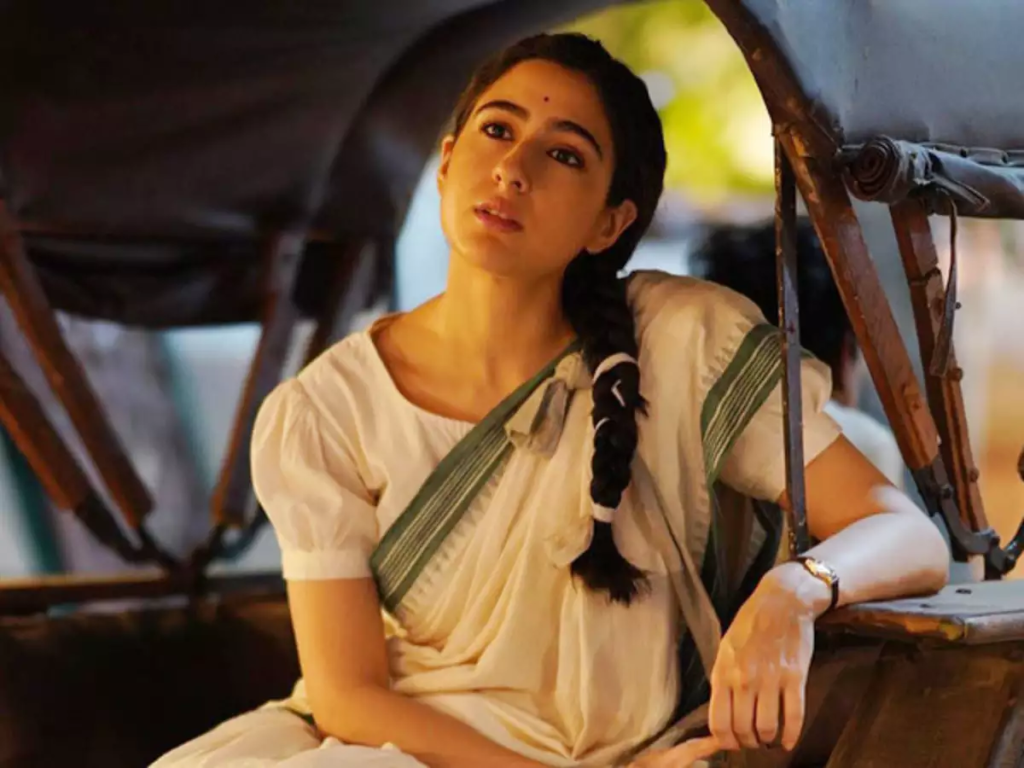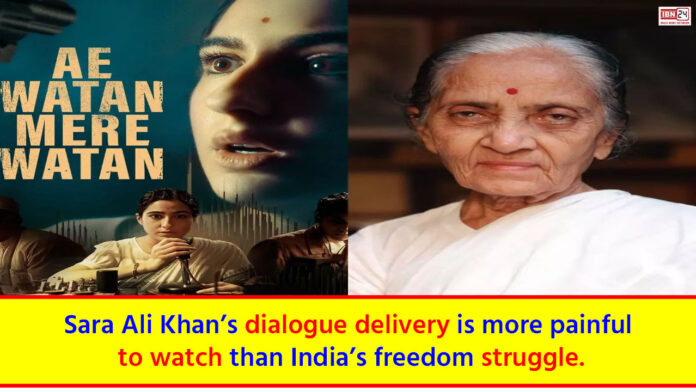Ae Watan Mere Watan reviews
Ae Watan Mere Watan reviews: Directed by Kannan Iyer and produced by Karan Johar, ‘Ae Watan Mere Watan’ released on March 21 on Amazon Prime Video. Dharmatic Entertainment, the OTT arm of Dharma Productions, has taken the title of its OTT direct film from a song. An adaptation of the hit Bollywood spy thriller Raazi.

Rashmika Mandanna
The film, in all honesty, is a sincere attempt at being a different, nuanced and well-narrated tale of an unsung hero in India’s freedom struggle, but Sara’s awful dialogue delivery, with several mismatched expressions, turns out to be the roadblock you can’t get past. I mean, we called out Rashmika Mandanna for her poor dialogue delivery in Animal, when she doesn’t even speak Hindi as her native language, so seeing Sara sail in the same boat was a bit painful for sure. Mind you, she does some amazing (ahem ahem) poetry in shuddh (pure) Hindi and is well-versed with Urdu too. Maybe a few dialect lessons would have saved her, and the audience too.
IBN24 NEWS NETWORK Facebook Channel Link: https://www.facebook.com/ibn24newsnetwork
India’s freedom struggle
Ae Watan Mere Watan reviews: The film depicts India’s freedom struggle in 1942 and follows the life of Usha Mehta (Sara), a young woman who, against all odds, expresses her hatred for the British authorities. It is only after the arrest of key freedom fighters that Usha and her loyal allies Fahadh (Spash Shrivastava) and Kaushik (Abhay Varma) take matters into their own hands. The film chronicles their journey as they set up an underground radio station called Congress Radio with the sole purpose of spreading a message of unity against British rule. Following the non-violent ideology of Mahatma Gandhi, their motto is ‘Karo Ya Maro’ (Do or Die) and some even take a vow of celibacy. During the trip, his meeting with Ram Manohar Lohia (Emraan Hashmi) gives a new direction to his revolution, followed by an exciting chase with British officials.

Loosely based on the life of this unsung hero, the biographical film serves as a chapter out of a history textbook. However, as the story unfolds, a bit of predictability sets in sooner that you’d imagine. Kannan Iyer returns to direction after over a decade since his directorial debut Ek Thi Daayan, and what a stark contrast of genres he picked to go behind the camera for. In his latest outing, he tries to keep the old-world charm intact, which is evident in the architecture of the buildings, narrow lanes, costumes as well as the dialect.
Glamorous avatar
Ae Watan Mere Watan reviews: Sara sported a overtly glamorous avatar in the Hindi film Happy Killings, which released last week, but in Ae Watan Mere Watan, she played a decidedly unattractive role. However, it is interesting to know how her wardrobe has changed from cotton suits and beautiful dupattas to cotton saris with puff-sleeved blouses. They seem to be trying to act reserved, but when you look at Sarah’s character it feels a little strange. She never convinces you as Usha or someone whose actions are very subtle. However, there is one particular scene where she enters a mosque hidden behind a burqa that is very well executed.

Imran on the other hand stands out as Lohia and brings gravitas to his performance. For example, there are some powerful lines where he says “Chahe kitni bhi teeliyan bujh jayein, hamare seene ki aag kabhi nahi bujhegi” (No matter how many matches go out, the fire in our hearts always burns).
Among other bits that are worth taking notice include Usha’s dynamics with her father, Judge Hariprasad Mehta (Sachin Khedekar). Be it their scenes from her childhood when she’s watching Serbian birds flying in the sky and wanting to have wings, to the times when she’s a grown up and confesses to her father that she’s working for the Congress, these well-written portions will move you.
Desh Ki Azadi
Ae Watan Mere Watan reviews: I particularly liked the entire sequence where Usha, Fahad and Kaushik devise a strategy to start a radio station. Ushas bua (paternal aunt) helped “Desh Ki Azadi” (Independence of the Country) decide the right time to broadcast as buying a radio for Rs 4,000 cost Rs 551. He wanted to do it, so he offered to sell him gold jewelry. Even when Martial Law is at home writing signature songs for All India Radio, you can feel the attention to detail in the writing department.
Pre-independence era
Ae Watan Mere Watan reviews: Since Ae Mere Wadan is set in the pre-independence era, one cannot help but notice the unnecessary use of Hindi words in the story. So don’t be surprised if you hear words like avaam, azaadi, kaayar, angrez, mazhab, zaalim, yudh, balidaan, garv, kranti, vidroh, shaheed, ahinsa, parcham, sangharsh and samrajya every two minutes. Yes, I tried to write down as many words as possible, they significantly expand your vocabulary.
Complicated tropes
Ae Watan Mere Watan reviews: Ae Watan Mere Watan might have some complicated tropes, which are tough to grasp if you aren’t paying proper attention, but you have to give it to the team for at least trying to simplify it. For instance, when Bombay Police is tracing Congress Radio and its location, the use of Triangulation technology is so well explained in-depth. All I wish for is that similar attention would’ve been given to Sara’s dialogue delivery techniques, so it would have been a more bearable watch of over two hours.
IBN24 NEWS NETWORK YOUTUBE Channel Link: https://youtube.com/@IBN24NewsNetwork?si=ofbILODmUt20-zC3
Read this also – Here, we highlight the top 10 best countries to study and work, each offering unique advantages and attractions.

